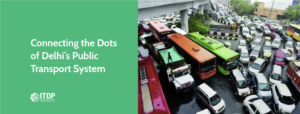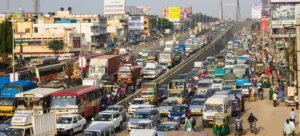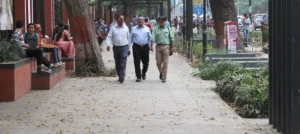
Written by Sai Ratna Chaitanya Edited by Kashmira Medhora Dubash
Urban mobility has always been a keystone sector to gauge urbanisation in India. Given that India’s population explosion is nowhere close to being defused, concerns regarding public transport issues are increasing by the hour. Most Indian cities rely heavily on public buses and informal public transport modes.
Written by Sai Ratna Chaitanya Edited by Kashmira Medhora Dubash
In cities where public bus services are constrained by operational and financial issues, informal public transport services address the gaps in connectivity. However, both buses and informal public transport have not kept pace with the rapid rise in population; invariably, there has been a rapid influx of personal motor vehicles in recent years and with it a plethora of issues—environmental, mobility, and living conditions.
Over the past five years, electrification has been pushed forward as a panacea towards reducing these negative effects. This has triggered interest at the national level with schemes supporting acceleration of electric vehicles in India. The Government of India approved the National Mission on Electric Mobility and subsequently, the National Electric Mobility Mission Plan 2020 was launched in 2013. As part of the mission, the Department of Heavy Industry notified the FAME scheme [Faster Adoption and Manufacturing of (Hybrid &) Electric Vehicles in India] for the purpose of incentivising and implementing electrification of motor vehicles.
City bus operators in India have a fleet comprising mostly of diesel and CNG buses. Electric buses are new to many operators and given the diversity of products available in the market, selecting optimum technology is challenging. For example: should operators procure a bus with overnight charging or intermediate charging? Should they try battery swapping? Which route should an operator choose to use the electric buses on; will the battery last a full day of service? Given the lack of clarity, many operators chose to run electric buses on trial before taking a decision to procure them.
BMTC (Bangalore Metropolitan Transport Corporation) was one of the first operators in the country to test an electric bus in 2014. Following this, public bus operators in cities like Hyderabad, Chandigarh, and Mumbai tested electric buses successfully. These trials helped the operators understand the challenges in operating electric buses. The most significant finding was that some electric buses could ply up to 250 kilometers after charging them for four hours at the depot. This meant, myths regarding the distance a bus can travel in a single charge and the time taken to charge the bus, were busted.
Following successful trials, some operators initiated plans to introduce electric buses in their fleet. Public bus operators such as the BMTC decided to procure 150 electric buses. Government of Delhi too, announced its plans to procure 1000 electric buses in their 2018-19 transport budget. However, given the high procurement costs and lack of funding, many projects failed to take off.
The FAME scheme had initially focused on electrification of private motor vehicles rather than buses and other forms of public transport. Incentives within the scheme were available to procure ‘hybrid’ electric buses but a very few operators showed interest. However, after the inclusion of incentives for full electric buses in the scheme, in 2016, the Department of Heavy Industries-Government of India received proposals from operators in cities like Mumbai, Delhi, and Bengaluru to induct electric buses
In November 2017, Mumbai’s BEST (Brihanmumbai Electric Supply and Transport) flagged- off 6 electric and 25 hybrid buses for passenger service. There was an uptake in proposals in response to an EoI (Expression of Interest) issued by Department of Heavy Industries to procure electric buses, cars and bikes. The Department received more than 40 proposals with plans for 3000 buses. However, the department only selected 11 cities with plans to procure 390 electric buses.
A month later, 10 cities completed the tendering process to procure electric buses. Of the 10 cities, Indore, Lucknow, Kolkata, Jammu, and Guwahati decided to go with outright purchase of e-buses. On the other hand, Bangalore, Mumbai, Hyderabad, Ahmedabad, and Jaipur decided to invite bids under a Gross Cost Contract (GCC). Under GCC, buses would be operated and maintained by the supplier at a fixed cost per kilometer. These cities expect to receive a subsidy of upto 60% of the capital cost of electric bus.
However, only a few cities have managed to complete the procurement process. Bangalore’s plans to procure electric buses under the Gross Cost Contract was put on hold after differences with the state government, and Mumbai cancelled tenders after challenges in procurement. Hyderabad on the other hand, received a few buses and is expected to launch services soon. Ahmedabad and Kolkata are also expected to launch services in February.
In 2019, cities like Kolkata, Hyderabad, Pune, and Ahmedabad will join Mumbai in operating electric buses. As more cities take their first steps towards transitioning to an electric future, it is important to take learnings from the past five years on procuring, rolling-out and operating electric buses. This is also the right time to evaluate funding mechanisms and focus on prioritising electrification of public buses over private motor vehicles.
Recent Blogs


Are flyovers the problem or the solution to traffic woes in Indian cities?

